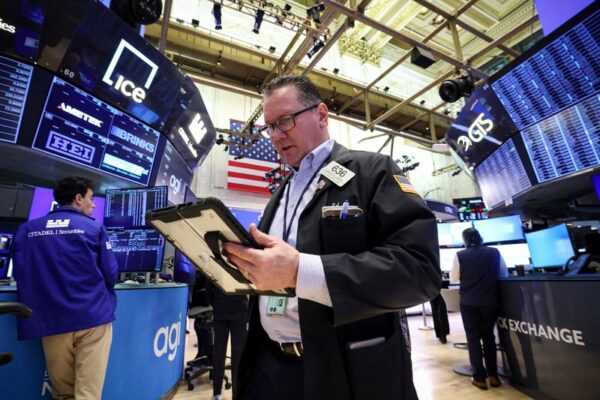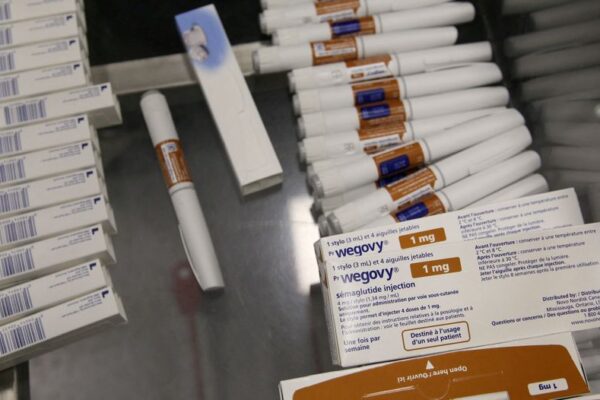Asia shares up as Singapore joins the pause camp
By Wayne Cole
SYDNEY (Reuters) - Asian shares firmed on Friday as Singapore became the latest country to pause its policy tightening and markets became more confident the likely next hike in U.S. rates would be the last this cycle.
The dovish signals helped keep non-yielding gold near one-year highs, while the euro led the currency pack as the European Central Bank stays stubbornly hawkish.
The Monetary Authority of Singapore (MAS) surprised many by leaving policy unchanged, saying the tightening already underway would ensure inflation slowed sharply later this year.
The MAS joined central banks in Canada and Australia in putting hikes on hold, while the U.S. Federal Reserve was seen nearer pausing after a soft producer price report.
Futures still imply a 67% chance the Fed will raise rates in May, but then almost zero chance of a further increase and maybe 50 basis points of cuts by year end.
Figures on U.S. retail sales are due later in the session and some analysts are warning the risk is for a downside surprise, which would support the dovish turn.
The prospect of a peak for rates helped offset worries about recession and MSCI's broadest index of Asia-Pacific shares outside Japan nudged up 0.4%.
Japan's Nikkei added 1.1% and Singapore stocks 0.5%.
Chinese blue chips firmed 0.2%, with the economic outlook brightened by a surprisingly upbeat trade performance.
"The stronger-than-expected March China export gain suggests that the economic recovery is more broadly-based than our expectations, and we have revised up our 1Q GDP forecast," wrote analysts at JPMorgan in a note, forecasitng a seasonally adjusted annual rate of 10.2% quarter-on-quarter from 9.0% previously.
EUROSTOXX 50 futures added 0.3% and FTSE futures 0.2%. S&P 500 futures and Nasdaq futures were steady after sharp gains overnight. [.N]
Investors are now bracing for earnings from Citigroup Inc (NYSE:C), Wells Fargo (NYSE:WFC) and JPMorgan Chase & Co (NYSE:JPM) which could test the bullish mood given recent stress in the sector.
"We will be looking at bank earnings calls to follow discussions around deposits, lending standards, and any adjustments to bank funding that might be planned, including more debt sales," said analysts at NatWest Markets.
EURO ON A ROLL
With EU industrial output beating expectations and inflation proving sticky, markets are still pricing in at least 50 basis points more tightening there and no cuts this year.
The divergence saw the spread between U.S. 10-year yields and German bunds shrink to its smallest in two years near 100 basis points.
A break under 100bp would see the spread at its narrowest since early 2014, when the euro was up around $1.3600. On Friday, the single currency was firm at $1.1059, having hit a one-year top of $1.1068 overnight.
The euro was also near highs seen back in November above 146.00 yen, and jumped to a 10-month peak on the Singapore dollar after the MAS decision.
The dollar was relatively steady on the yen at 132.57 yen, supported by the Bank of Japan's still uber-easy policy stance.
All the talk of future U.S. rate cuts has given non-yielding gold a boost, with the yellow metal up at $2,044 an ounce after striking a one-year peak of $2,048.71 overnight, not far from its all-time top of $2,069.89. [GOL/]
Oil prices steadied, having slipped overnight after OPEC flagged downside risks to summer oil demand in a monthly report, highlighting rising inventories and challenges to global growth. [O/R]
Brent edged up 27 cents to $86.36 a barrel, while U.S. crude rose 26 cents to $82.42 per barrel.












 Bitcoin
Bitcoin  Ethereum
Ethereum  Tether
Tether  XRP
XRP  USDC
USDC  Solana
Solana  TRON
TRON  Dogecoin
Dogecoin  Lido Staked Ether
Lido Staked Ether